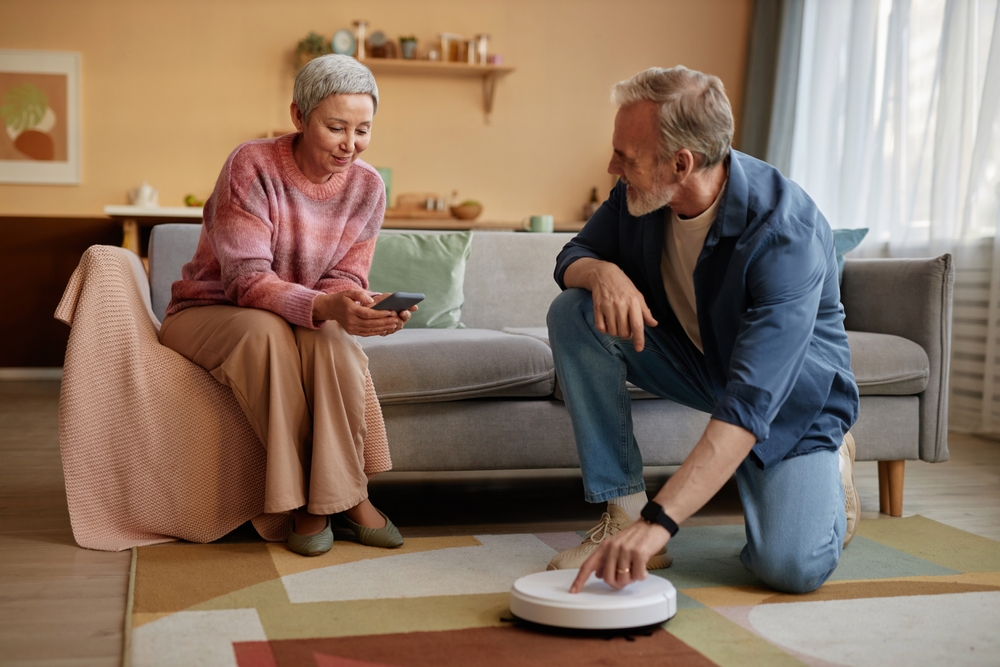
Household appliances used to be simple machines, but the rise of smart technology has changed everything. Today’s refrigerators, washing machines, and even coffee makers connect to Wi‑Fi and collect data. Seniors and retirees often adopt these devices for convenience, unaware of hidden risks. Behind the scenes, appliances transmit personal information to marketers and third parties. Understanding which devices share data is essential for protecting privacy.
Smart Refrigerators
Smart refrigerators track usage patterns, food inventory, and even shopping habits. Sensors monitor when doors open, what items are stored, and how often they’re consumed. This data is shared with manufacturers and sometimes grocery partners. Seniors may unknowingly reveal dietary preferences and health information. Smart refrigerators are marketed as helpful, but they also serve as data collectors.
Washing Machines and Dryers
Modern washing machines and dryers connect to apps that monitor cycles and energy use. These devices collect data on household routines, including laundry frequency and preferred settings. Marketers use this information to target ads for detergents, fabric softeners, and energy plans. Seniors who rely on smart laundry appliances may expose personal lifestyle details. What seems like convenience doubles as surveillance.
Smart TVs
Smart TVs are among the most notorious data collectors. They track viewing habits, app usage, and even voice commands. Seniors who enjoy streaming services may have their preferences sold to advertisers. Some TVs also monitor device connections, revealing household tech ecosystems. Smart TVs blur the line between entertainment and marketing surveillance.
Voice‑Enabled Assistants
Appliances integrated with voice assistants like Alexa or Google Home collect vast amounts of data. Commands, schedules, and preferences are stored and analyzed. Seniors who use voice assistants for reminders or entertainment may expose sensitive information. Marketers exploit this data to target ads and promotions. Voice‑enabled appliances turn conversations into marketing opportunities.
Smart Thermostats
Smart thermostats monitor temperature preferences, energy use, and occupancy patterns. Seniors who program thermostats for comfort inadvertently reveal daily routines. Marketers use this data to promote energy services or related products. Utilities may also access information for demand management. Smart thermostats transform household comfort into marketable data.
How Marketers Use the Data
Marketers use appliance data to build detailed consumer profiles. Seniors may be targeted with ads for health products, financial services, or lifestyle brands. Data reveals routines, preferences, and even medical conditions. Companies profit from insights while retirees lose privacy. Appliance data becomes a powerful tool for influencing consumer behavior.
Protecting Your Privacy
Seniors can protect their privacy by disabling unnecessary features and reviewing settings. Avoiding voice assistants or limiting app permissions reduces exposure. Choosing appliances without Wi‑Fi connectivity is another option. Seniors should also review manufacturer policies before purchasing. Awareness and proactive steps safeguard retirement privacy.
Household appliances once served simple functions, but smart technology has turned them into data collectors. Refrigerators, washing machines, TVs, thermostats, and kitchen gadgets all transmit personal information. Seniors must recognize the risks and take steps to protect their privacy. Retirement should be about comfort, not surveillance. By understanding which appliances send data to marketers, retirees can make informed choices and secure their independence.
Have you discovered your appliances collecting data? Sharing your experience could help other seniors protect their privacy.
You May Also Like…
- How a Proposed New Federal Act Will Safeguard Your Digital Privacy
- Homebuyers Just Got a Major Privacy Win—Here’s What Changed
- Why a Free, No-Logs VPN Is the Smartest Choice for Online Privacy
- 6 Devices in Your Home That Could Violate Privacy Laws
- The Data Broker Industry Quietly Tracking Your Every Move







